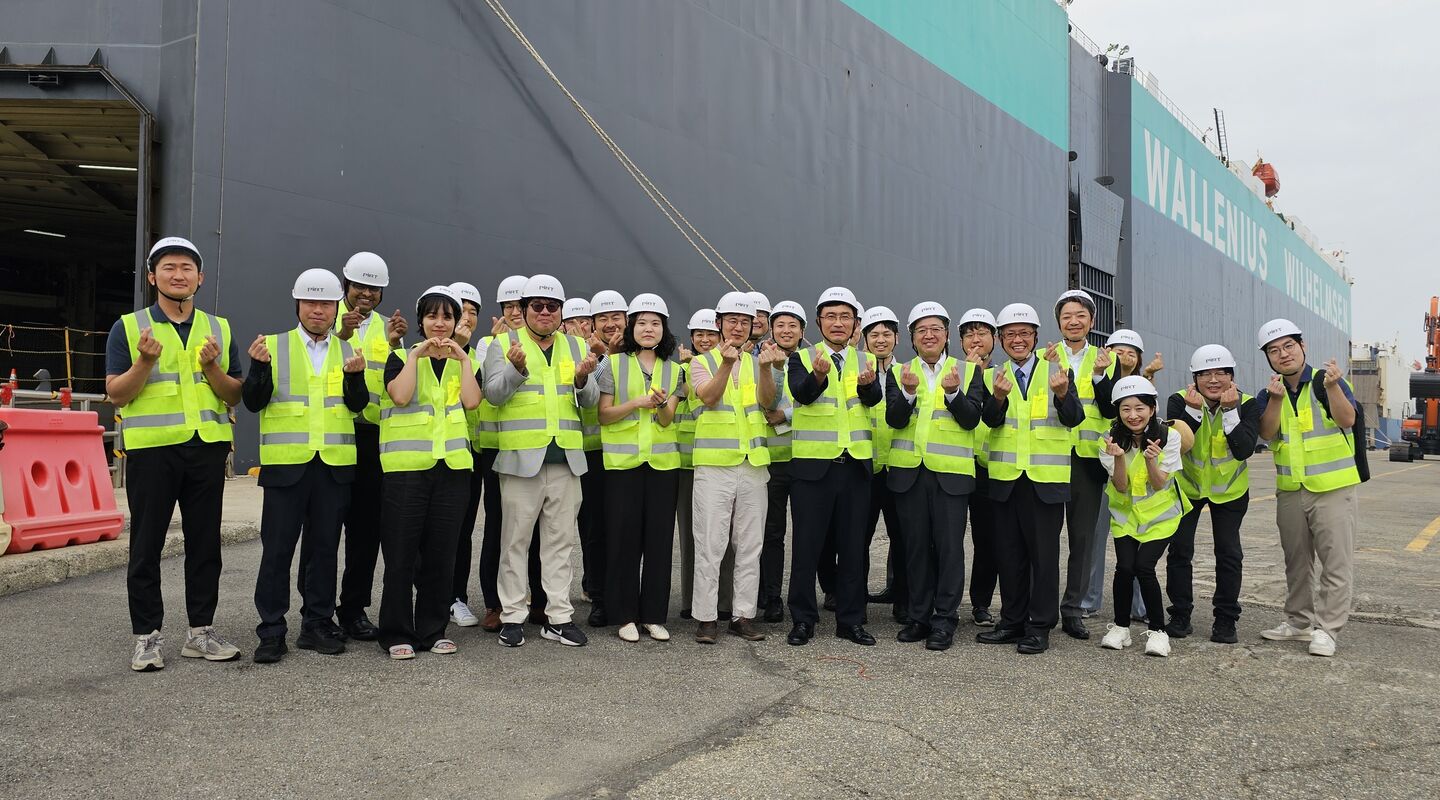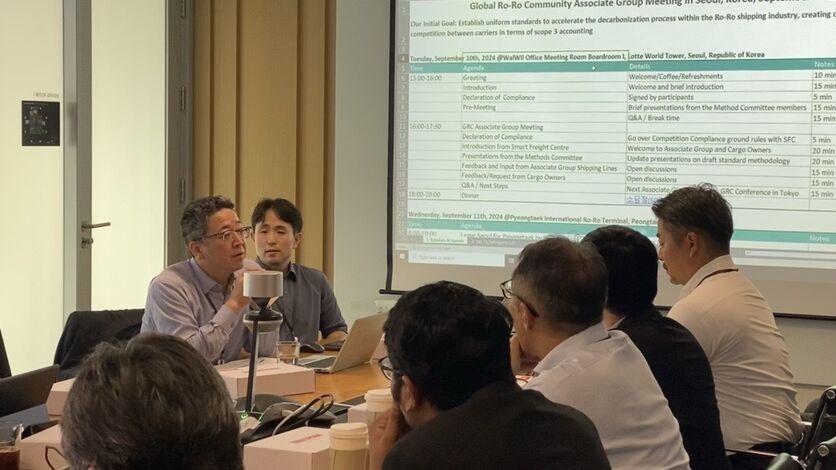Our shared journey in decarbonization: The GRC associate group meeting in Seoul
As we continued to chart its course towards a sustainable future, the Global RoRo Community (GRC) Associate Group meeting in Seoul on September 10 and 11, 2024, stood as a pivotal moment in our continued journey to zero emissions. This meeting hosted by Smart Freight Centre and GRC members brought together over 100 global participants, both online and offline, including major deep-sea RoRo/PCTC operators, classification societies, cargo owners, NGOs, and other stakeholders. The goal was to strengthen our approach to GHG emission accounting for deep-sea RoRo shipping.

What is GRC and why this meeting matters to us?
GRC stands for Global RoRo Community. The GRC’s first goal is to finalize and announce its Green House Gas (GHG) emission accounting guidelines for deep-sea RoRo transportation. This will take place at the Clean Cargo & GRC Conference in Tokyo on October 17, 2024. This meeting is the first time we engaged cargo owners globally. We will also hold another online meeting with the Associate Group to gather feedback from cargo owners and other stakeholders to finalize our draft standard. By improving our GHG emission accounting methods, GRC is paving the way for a more sustainable maritime industry.
Day 1 - The Importance of the Seoul meeting
The Seoul meeting wasn’t just another gathering—it was where the rubber met the road in our quest to define a global standard for Greenhouse Gas (GHG) emissions in our sector. Onsite, attendees included GRC Associate Group members from the Far East, such as ClassNK, Eastern Car Liner, Mitsui O.S.K. Lines (MOL), NYK Line (NYK) and Wallenius Wilhelmsen. Key stakeholders in Korea, like Hyundai Glovis, Korean Register (KR), and Solutions for Our Climate (SFOC), also participated.
Given that Far East Asia is the largest export region for Automotive and High & Heavy (Construction, Agricultural, & Mining equipment), collaboration among stakeholders in the region is essential for achieving our shared goal of decarbonizing the industry.
The decisions made during this meeting will directly influence how we, as an industry, measure and manage our environmental impact. Our aim is to establish uniform standards to accelerate the decarbonization process in the Ro-Ro shipping industry, ensuring fair competition between carriers in terms of scope 3 accounting.

Key Topics Under Review
The committee revisited several outstanding items that required further deliberation from the previous meeting in August:
1. Scope 3 calculation for cargo owners: The committee examined whether the "Shortest Feasible Distance x 15%" adjustment, used in the Clean Cargo methodology for containers, was appropriate for our operations.
2. Aggregated trade lanes: Proposed ideas by NYK and Wallenius Wilhelmsen were reviewed to ensure they met the needs of all other carriers and cargo owners and aligned with industry standards.
3. Ballast/reposition legs allocation: The committee explored different methods for allocating these legs, with options ranging from following the GLEC Framework to a 50/50 split between voyages. This decision played a crucial role in how we accounted for emissions during non-revenue-generating segments of our journeys.
Our role in a sustainable future
As these vital discussions unfolded, it was a powerful reminder that our journey toward sustainability is a shared responsibility. Whether directly contributing in the committee or offering support from the sidelines, every effort plays a key role in driving our progress forward.
“The meeting provided ample time for open discussions, allowing participants to voice their thoughts, ask questions, and actively contribute to the decision-making process. This is crucial for the shipping industry as we strive to achieve our ambitious vision. We all have a role in driving change to meet global climate targets, and the shipping industry has the potential to take the lead”, said Capt. Yohei Mozumi, Decarbonization promotion team at NYK, who flew all the way from Japan to participate the meeting.
Day 2 -Visit to Pyeongtaek International RoRo Terminal
On the second day, the participants visited Korea's biggest automotive port at PIRT. This special visit, not part of the usual monthly meetings, offered valuable insights into decarbonization efforts. This port visit wasn’t a typical part of GRC’s monthly agenda, but it served a crucial purpose.
The program began with a welcome by Mr. Seokgoo Kim, CEO of Gyeonggi Pyeongtaek Port Corporation (GPPC), who introduced the Port of Pyeongtaek. This was followed by presentations from the PIRT team, giving an overview of the port's operations and infrastructure.
SFOC then shared insights on two key topics: the implementation of Alternative Marine Power (AMP), also known as "Shore Power," and the ongoing decarbonization efforts at ports in South Korea. The day concluded with a facility tour of PIRT, where participants explored the terminal yards and berths.
The visit to PIRT helped build stronger collaboration with key stakeholders such as shipping lines, terminal operators, port authorities, government agencies, and potential partners in low-carbon technologies.
We are in this together: Our Shared Journey in Decarbonization
The past GRC meetings were mostly held online, lasting 1.5 hours in one day, every two weeks, for the Methods Committee members. We've had hybrid meetings too, with the in-person kick-off during the Smart Freight Week conference in Amsterdam in April, another Methods Committee meeting in Tokyo hosted by ClassNK in July, and the third one in Korea, hosted by Wallenius Wilhelmsen. The next in-person meeting will be in Tokyo at Kudan Kaikan on October 17, hosted by Smart Freight Centre and ClassNK. These efforts reflect our collective responsibility and commitment to achieving a sustainable future through collaboration.
“Key takeaways from Seoul include the importance of collaboration and fair competition in achieving carbon neutrality, highlighted by engagements with Hyundai Glovis, Korean Register, Korea Research Institute of Ships & Ocean Engineering (KRISO), GPPC, and SFOC. There was also strong interest in advancing Green Corridor initiatives and decarbonizing port operations, with a focus on AMP readiness,” said Sakurai Yasuyuki, Senior Manager in the Decarbonization Taskforce.


